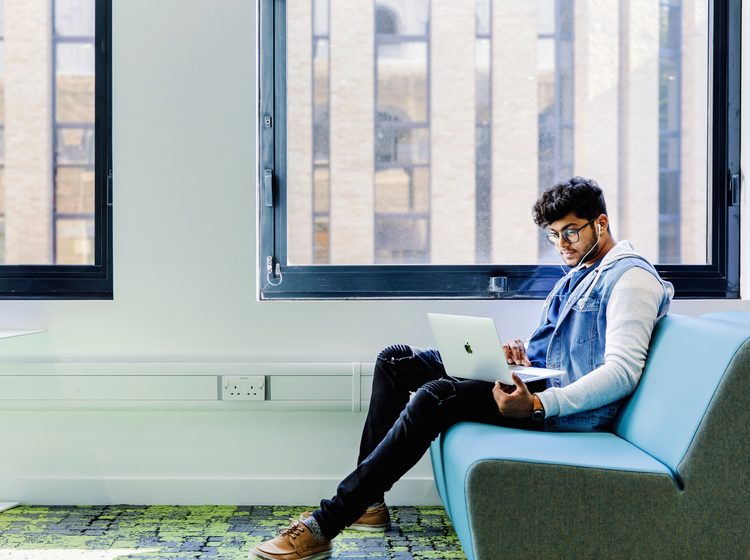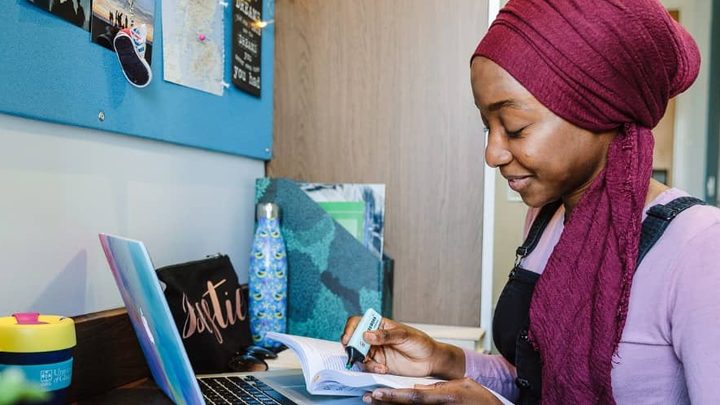If you’re finding it difficult to concentrate on your studies, you’re not alone — we all get distracted sometimes! Don’t worry though, because it’s definitely possible to improve your focus. Here are our top tips on how to concentrate better when you study.
1. Turn off your notifications
Did you know that the average person receives 100 smartphone notifications per day? With everything from Twitter to TikTok demanding our instant attention, it’s no wonder scientists say our attention span is actually shrinking!
Thankfully, this is relatively easy to fix. While switching your phone off is one option, it’s surprising how much you can improve your concentration just by turning off notifications. This way, your phone is still there if you need it, but you won’t be distracted by it constantly buzzing.
Another useful tip for avoiding distractions is to wear a wristwatch, or sit near a clock. It’s so easy to end up scrolling through social media when you only picked up your phone to check the time — avoid temptation by finding another way to tell the time.
2. Listen to music
While it’s important to find a quiet place to study, total silence isn’t always achievable. Noise from traffic outside, people talking or even fingers tapping on a keyboard can interrupt your train of thought.
In these situations, listening to music can help you concentrate better. Not only does it block out background noise, but it helps you to relax and improves your mood, which creates a more positive study experience.
Music is also linked to long-term memory, and recalling the music you were listening to while studying can help you remember what you learned.
What music should I listen to to concentrate better?
Everyone’s taste are different, so the answer won’t be the same for everyone. But as a general rule, ‘neutral music’, usually without lyrics, is better for when you’re reading and writing.
Listening to classical music while studying is popular for this reason: some people even believe the so-called ‘Mozart Effect‘ can improve your reasoning and problem-solving skills.
Other popular choices include environmental sounds, like birdsong or rainfall, or “binaural beats” which many people say helps them to concentrate. If you don’t know where to start, check out Spotify or Youtube. Both have lots of playlists of music to help you focus.

3. Set realistic goals
Setting yourself goals helps with study by giving you something to work towards. However, it’s important that your goals are specific and achievable.
For example, many people set goals that are too vague, like “I will study and achieve a lot today”. You should also avoid being too ambitious: you might end up feeling stressed and upset if you don’t achieve everything on your 3-page “to do” list.
Instead, set realistic goals, like “I will practise my spoken English this morning”, or “I will read 2 chapters of my history text book this afternoon.” You will find it much easier to concentrate your mind on your studies if you only focus on one topic at a time.
Trying to learn about lots of different things at once will overload your brain with too much information, and you may end up finding you can’t concentrate at all.
4. Reward yourself in your breaks
No one can study all day without losing focus — it’s just not possible! If you really want to focus on studying, you need to split it down into manageable blocks of time with plenty of breaks in between.
One great tip to help you concentrate better is to reward yourself with something you enjoy in your breaks. Whether it’s treating yourself to a square of chocolate or watching an episode of your favourite show on Netflix, rewarding yourself for a job well done will improve your mood and boost your focus during your study sessions.
Try thinking about what fun activities you’re going to do during your breaks at the start of the day, as this can really help you get motivated to study. After all, the sooner you start studying, the sooner you can take a break!
5. Get a study buddy… or a study bunny
It’s easier to concentrate when others around you are concentrating too. Peer pressure can be a great motivator! However, if studying with friends isn’t practical, there are a range of other fun things you can try.
For example, try searching YouTube for “study with me” — there are lots of videos of people studying quietly in real time. Simply leave the video playing while you get to work and you’ll have a comforting presence encouraging you to keep your focus.
If a study buddy isn’t your thing, how about a study bunny? Study Bunny is a fun free productivity app for students, featuring your very own customisable bunny! You can add a daily “to-do” list, learn with flash cards or simply set a timer for however long you’d like to study to keep you motivated.
In return, you’ll earn virtual coins for every minute of study that you can spend on things like study music to help you concentrate, or a trendy new outfit for your bunny. The built-in calendar automatically tracks your study, and you can assign different colours to different subjects too.
The more you study, the happier your bunny will be — if you stop for too long you’ll make your bunny cry!
Find more study tips
We hope these tips help you concentrate better on your studies! We have lots more tips and advice for hand-picked for international students on our blog.






